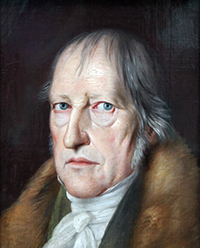The significance of that ‘absolute commandment’, know thyself — whether we look at it in itself or under the historical circumstances of its first utterance — is not to promote mere self-knowledge in respect of the particular capacities, character, propensities, and foibles of the single self. The knowledge it commands means that of man’s genuine reality — of what is essentially and ultimately true and real — of spirit as the true and essential bein.
georg Wilhelm Friedrich Hegelquotes
1770 - 1831
 German philosopher George Wilhelm Friedrich Hegel (1770-1831) was learning Latin declensions by age three, and enrolled in Latin school at five. His love of knowledge was instilled from the earliest age. Known for his attempt to synthesize opposites, like spirit and nature, to understand the whole, Hegel was an Absolute Idealist with a strong Christian faith.
German philosopher George Wilhelm Friedrich Hegel (1770-1831) was learning Latin declensions by age three, and enrolled in Latin school at five. His love of knowledge was instilled from the earliest age. Known for his attempt to synthesize opposites, like spirit and nature, to understand the whole, Hegel was an Absolute Idealist with a strong Christian faith.
His philosophies were influenced by Immanuel Kant, Johann Gottlieb Fichte and Friedrich Wilhelm Joseph Schelling, and all the Greek philosophers. He has even been called the “Aristotle of modern times.” Hegel proposed a new form of thinking called “speculative reason”, and was the first philosopher to seriously regard the history of society as essential for understanding the individual.
The University of Jena hired him as an unsalaried professor where he worked for many years, and wrote extensively. Later, he accepted paid teaching positions at both the University of Heidelberg and the University of Berlin. A school of Hegelianism eventually formed, but since Hegel’s ideas are experiential and not strict methods of set principles, philosophers of all types have been able to draw inspiration from his works over the years, whether atheist or believer, conservative or liberal.
There are four main books Hegel produced in his life (Phenomenology of Mind, Science of Logic, Elements of the Philosophy of Right, and Encyclopedia of Philosophical Sciences) that clarify his dialectical system for finding a place for everything be it history, ethics, politics, or religion. Many of his other essays and works were compiled by students’ lecture notes, and published after his death from cholera in 1831.
When we look at the world rationally, the world looks rationally back.
The only Thought which Philosophy brings with it to the contemplation of History, is the simple conception of Reason; that Reason is the Sovereign of the World; that the history of the world, therefore, presents us with a rational process.
Beauty and art, no doubt, pervade all business of life like a kindly genius, and form the bright adornment of all our surroundings, both mental and material, soothing the sadness of our condition and the embarrassments of real life, killing time in entertaining fashion, and where there’s nothing to be achieved, occupying the place of what is vicious, better, at any rate, than vice.
What is reasonable is real; that which is real is reasonable.
Evil resides in the very gaze which perceives Evil all around itself.
The length of the journey has to be borne with, for every moment is necessary.
An idea is always a generalization, and generalization is a property of thinking. To generalize means to think.
If we are in a general way permitted to regard human activity in the realm of the beautiful as a liberation of the soul, as a release from constraint and restriction, in short to consider that art does actually alleviate the most overpowering and tragic catastrophes by means of the creations it offers to our contemplation and enjoyment, it is the art of music which conducts us to the final summit of that ascent to freedom.
freedom / human / liberation / music
When a father inquired about the best method of educating his son in ethical conduct, a Pythagorean replied: “Make him a citizen of a state with good laws.